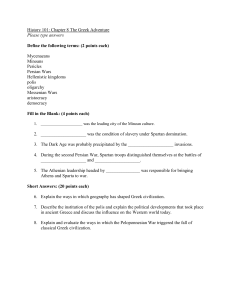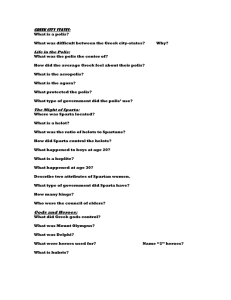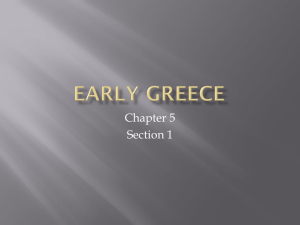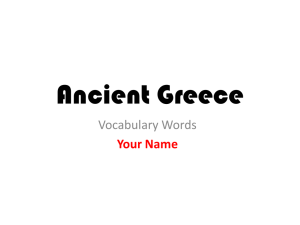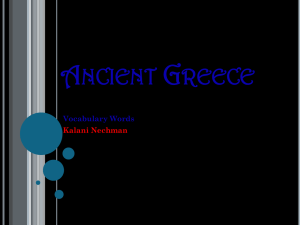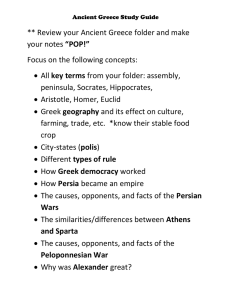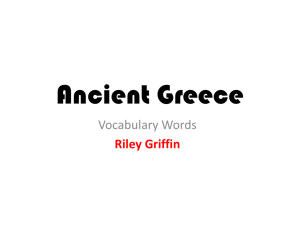Bell work 10/15/14
advertisement
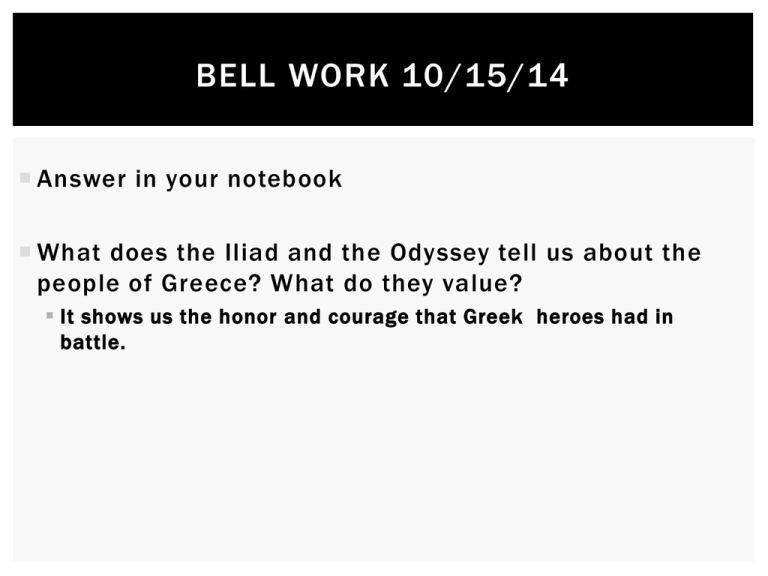
BELL WORK 10/15/14 Answer in your notebook What does the Iliad and the Odyssey tell us about the people of Greece? What do they value? It shows us the honor and courage that Greek heroes had in battle. BELL WORK 10/16 STRANDED –(DON’T FORGET VOCAB QUIZ TOMORROW) Imagine that the class has been stranded on a deserted island. In the interest of survival everyone has decided to create a government for the island. You have 15 minutes to accomplish the following as a class. 1. Decide who will do the following – hunt and gather food, cook, make shelter, explore the rest of the island, and take care of the sick/injured 2. Create your first 10 rules. 3. Decide how you will determine if someone is guilty of breaking any rules 4. The punishment for breaking any rules 5. How rules will be made in the future. REFLECT – ANSWER IN YOUR NOTEBOOK How well did the class work together? What would have made it go more smoothly? What problems did the class run into? Did you agree with all of the rules? Why or why not? What did this experiment tell us ? T YPES OF GOVERNMENT Monos – Single Oligos – Few Archy – Rule Demos – People Arios- best (wealthiest) Kratos – Power Tyrannos – usurper with supreme power Given that information, what do you think these types of government look like? Monarchy Oligarchy Democracy Aristocracy Tyranny Which of these best describes the type of government the class came up with? QUIZ You have until I check in all the vocab lists to study GO 1. Highlight main ideas -ONLY the most important (think Sports Center) TODAY We will be completing a jigsaw concerning the governments of ancient Greece Step 1 Complete an active reading of your text Step 2 Complete the column that goes with your type of government Step 3 Create a drawing that represents your type of government on the back of your chart Step 4 work with the members of your group of four to finish your charts. EACH PERSON should take turns explaining what they found along with their drawing 2. Underline new vocab and define in margins -First try to use context clues -If that doesn’t work, look it up! 3. Mark up the text as if you’re talking to it! !- Interesting information ?-Ask all types of questions (Who, Why, What, Where, I wonder if…) *- Make Connections (to yourself, to the world, to other text) GREEK DARK AGE Af ter the fall of Mycenaean Civilization around 1100 BCE Greece goes dark Decreasing production of art & pottery Agriculture collapses People flee due to famine Writing using Linear B vanishes BELL WORK 10/20 Turn in your homework Take out and review your government chart, you will be need to be able to explain them to your peers in a moment. Be sure you know the advantages and disadvantages! THE ARCHAIC AGE & THE POLIS Polis=City State contained an agora which means gather space (agoraphobia is the fear of open or crowded spaces) and acropolis within its fortifications. Each polis was autonomous from all other poleis. The strength of the community came through the cooperation of citizens However, most women were restricted to the home Also, we derive the word Politics from the word Polis WARFARE SHAPES GREECE "We must rather regard every citizen as belonging to the state“ Aristotle New military technology increases the power of the middle class Hoplite- a citizen/soldier who was armed with a spear, shied & sword Phalanx- a formation of heavily armed foot soldiers that was 16 people wide & 16 people deep required extensive training promoted a sense of unity among the citizens ©2003 Wadsworth, a division of Thomson Learning, Inc. Thomson Learning™ is a trademark used herein under license. GREEK COLONIZATION Cause the dif fusion (spread) of Greek culture throughout the Mediterranean Fostered a Greek identity by introducing Greeks to people of other languages and customs Increased trade and industry leads to a group of rich men who desire political privileges In response to the aristocrats came the tyrants who sought to solve economic disparity and encourage the economic and political progress of the polis SPARTA Sought stability and conformity while emphasizing obedience Started with just four villages, once unified they conquered their neighboring Laconians many become perioikoi or free inhabitants required to pay taxes SPARTA Other Laconians become helots who became slaves to the Spartans Helots did all of the farming for the Spartan population They also had war declared on them every year Subsequently, the military became the center of Spartan life in order to defeat any potential uprisings of the helots ATHENS Started as a monarchy in 700 BCE By 600 control had moved to the aristocracy Solon- elected archon in 594 B.C. outlawed debt slavery and freed those already enslaved, granted citizenship to foreigners, gave Athenian assembly more say in government ATHENS AGE OF T YRANNY Internal issues following Solon’s rules result in an age of tyrants Pisistratus seized power in 560 BC Offers land reform, beautifies city & creates jobs Hipparchus (hippias) takes power after his father Institutes a number of harsh unpopular reforms, is exiled and later killed Aristocrats try to establish an oligarchy when.. Cleisthenes – another reformer, broadens the role of citizens in government, set up the council of 500, and allowed to assembly to actually WRITE & VOTE on laws Harmodius and Aristogeiton, killing Pisistratus' son Hipparchus
